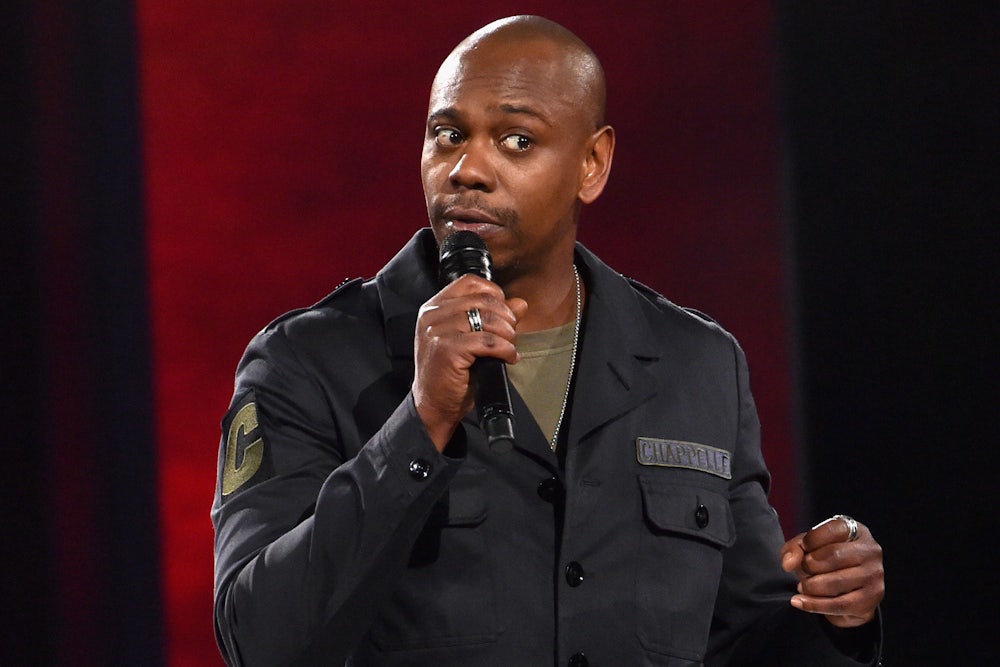Dave Chappelle is no stranger to controversy. Twelve years ago, at the height of his career, Chappelle walked away from his hit television show and a $50 million deal with Comedy Central. So many Chappelle’s Show segments—and not just the ones he did about Rick James, Charlie Murphy, and Prince—have already become the stuff of legend, and the show is rightfully credited for dramatically changing the way American audiences think, talk, and laugh about race.
For several years he stayed out of the public eye, but Chappelle has gradually raised his profile back to its previously lofty heights, most notably as host of Saturday Night Live the weekend after President Donald Trump’s election. Still, it was Tuesday’s release of two new comedy specials—filmed at Austin City Limits Live in April 2015 and at the Hollywood Palladium in March 2016, part of a three-special deal he signed with Netflix for a reported $60 million—that was supposed to mark the legendary comic’s triumphant return. To say anticipation has been running high is no small understatement.
I watched both specials back to back. I laughed, a lot. But I cringed more times than I should have. You can forgive a ballsy comedian like Chappelle a couple of lame LGBT jokes—pushing buttons is what he does, and goodness knows PC culture deserves some skewering every now and then. But Chappelle spends an awful lot of time in these specials discussing LGBT issues. They are easily the least funny parts, mostly because they showcase a man who seems stuck in a time warp, hung up about things he really shouldn’t be hung up about.
This is hardly the first time Chappelle’s material has been called homophobic. Just this past November, a gig he did at The Cutting Room in New York City left many progressives cold (while winning over many on the right). Why does Chapelle feel so compelled to return again and again to these topics, especially if he’s not going to offer a fresh perspective on them?
Chappelle’s go-to voice for every gay man in his two specials—high-pitched, over-enunciated, effete—is one that most people will recognize from comedians and television shows from the 1980s and 90s. His riff on how gays “always have some kind of political argument” comes with a curious example about how he had argued with a gay man who was petitioning to remove the words “husband” and “wife” from marriage licenses. “Nigga please, save me the semantics,” Chappelle says. “Take your chips out of the casino, you’re about to crap out. Go outside, talk it over amongst yourselves, and whichever one of you is gayer, that’s the wife.”
Here’s the problem: Even if some of his audience finds these dead-fish-in-the-barrel jokes funny, why does Chappelle? Chappelle’s Show was brilliant because it upended our notions of race, not because it trotted out tired stereotypes.
Chappelle is even more tone-deaf on transgender issues. He seems to have little interest or patience with any notion of transgender identity, going on an extended rant about how he “misses” Bruce Jenner. He reduces gender assignment surgery to a crude joke about how strange it would be if he and his friend were to go to the hospital one afternoon to “cut their dicks off.” Worse, he acts offended when someone corrects his use of a pronoun, as if it’s somehow a burden on him to have to refer to a transgender woman as a “she.”
A particularly callous part comes when he cites “black dudes in Brooklyn, hard, street motherfuckers, who wear high heels just to feel safe.” You’d almost think that Chappelle is convinced that the progress trans people have made in the last few years has come at the expense of black progress. But discrimination isn’t a zero-sum game. And newsflash—many trans people are people of color. Statistically, they are also the most likely to be sexually assaulted. That Chapelle thinks it’s funny to joke about how they have it better than black men demonstrates the kind of myopic worldview that only a rich male comedian might have.
Does Chapelle think it’s his duty to nurture homophobia and transphobia in a country where racism is still alive and well? Perhaps, since some racist white people are still calling him “nigger,” he feels like it’s his right to use the word “fag”? It’s a lot harder to take his social commentary about racism seriously when he feels the need to diminish other marginalized groups.
There’s nothing more depressing than having to explain why certain jokes just aren’t funny. Critics of comedy are labeled dour, defensive killjoys, and articles like these tend to only confirm for many people that liberals are snowflakes who take themselves too seriously. But to dismiss the blatant homophobia and transphobia on display in Chappelle’s latest specials as just innocuous “comedy” is to belittle Chappelle’s genius. Precisely because his material is usually so much smarter and funnier is why people like me are going to call him out when his routines feel backwards or stale. Someone needs to tell Chappelle that Eddie Murphy did “Delirious” back in 1983.
